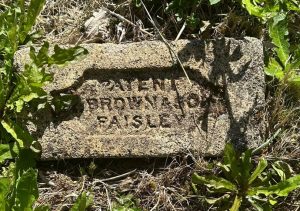Found by David McGarrigle in Paisley
Knock Patent no. 270605, Robert Brown & Son Ltd Paisley
A broken section of sanitary ware
Robert Brown & Son, Ferguslie Fireclay Works and Caledonian Brick and Tile Works, Paisley.
.
.

08/10/1987 – The Glasgow Herald – The missing link in Paisley’s toilet chain.
Re toilets, it was interesting, although less than very interesting, that a relic of the schooner
of Kaiser Wilhelm 11 was last week sold in Glasgow. It took the shape of a three-piece bathroom suite.
On its voyage of good use since the Kaiser’s boat, it had been working in a house in Fife.
On Saturday it was auctioned to a dealer in Edinburgh for £500.
On the wc item – and this is very interesting – was proclaimed the name Knock of Paisley.
That is the story so far. The tale was adorned with a photo in the Herald last week.
Today’s mission is to find the maker. Paisley talks a lot about its historic builders of
thrones for bathrooms. (Mr Shanks was a Paisley man; Mr Doulton had a factory there.). Yet
the early signs were that written history has flushed Knock from its pages.
Ellen Farmer, president of the Old Paisley Society, said: “I saw the story in the paper, but
I’ve not heard of him. I’d been meaning to look him up in the old directories.” Ken
Hinshelwood, local history librarian, tried that: no Knock.
Valerie Riley, keeper of local history at the museum, had been asked by the auctioneers
about Knock. “I sort of drew a blank,”. She said. Sylvia Clark, an industrial archaeologist,
who has almost finished writing a history of Paisley, mentioned another town firm, called
Brown, who also made the bricks. But Knock? Never.
So I took the problem out of Paisley along the route that Mr Shanks took: from plumbing
in Paisley, his firm started in ceramic engineering before the end of last century in Barrhead.
After all that time, Barrhead has the deepest collection of loo lore in Scotland. “I can’t say
I’ve ever heard of Knock,” said Tom Brown, the administration manager.
I began to feel the way the old lady did who was locked in a lavatory from Monday to
Saturday. Was there nobody out there?
Knock, whoever he was, had to be famous. Short of being given a place in dictionaries,
like Captain Boycott or Lord Sandwich, there is no more enduring way for a man to keep his
name in the public eye than on a wc.
Twyford, Doulton, Jennings, Shanks, Crapper, Duckett, Humpherson … They live, even
although some of the firms they started do not. Their fame was more than merely
industrial. They were heroes in their own households.
Their daily work out them next to being godly. Before them, people remembered, the job
that could now be done indoors in sweet air had required an outing to the garden to pluck a
rose, which was one way of putting it, or to pick a daisy, which was another.
And Paisley’s place in the revolution of the smallest room, which the medieval monks
called the necessarium, was glorious.
Robert Brown, the company mentioned by Sylvia Clark, was exporting to America as
early as 1870. Mr Doulton gave his address as Lambeth, Paisley, and Paris, which showed a
nearly suitable sense of priorities.
Mr Doulton was so moved by the exotic shape of the word Paisley that he put it as the
title on one of his posher pedestals. It came in blue, magnolia or wild rose. Thereby was
the rest of the world given the chance to rubbish Paisley in a most cruel and personal way.
These profound researches (which have put an entire day of my young life down the
pan) came up with one further Paisley pearl. There was once a loo called Seestu, which is
the lyrical name given to the town by its poets. Not many people know that.
Nor may they be aware of early attempts to make water closets look like something
else – pieces of sculpture, say, or a Greek column. Thrones were sometimes sat on the
backs of recumbent lions or on swans in flight.
I tell you that only to be able to mention the favourite character I have met on this long
day’s search. His name was Steven Hellyer. He was a kind of high priest of Victorian
plumbing and wrote books about it.
Hellyer believed that all humane men would hesitate to use a receptacle that had
sculpted knobs on the outside because it would mean much extra work for house servants.
He wrote: With the utmost care in using such closets as urinals, it is impossible at all times to
urinate into the basin so neatly that splashes, mishaps, and drops … Shall not fall upon the
edge of the basin and run down over its exterior parts.
I quote his words for their delicacy in the hope that I may have shown some of the
same. I have nothing else to show. Tracing Knock has KO’d me. Any of you who have
thoughts, please share them. Distance is no object. I’d even spent a penny for them.
On the subject of spending a penny. I do not expect soon to come upon a more flagrant
expression for having to go to the necessarium than one about plucking a rose. During the
glum depths of the afternoon, however, I came across a French phrase that was rewarding.
During the war, nice-minded patriots who had to go to a place took to saying: Je fails
telephoner a Hitler. It’s not much to learn from a whole column of ink, but it’s all there’s
going to be.











